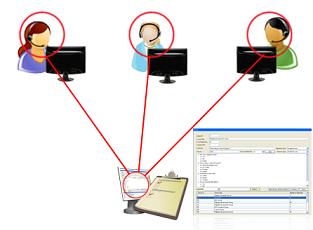Published by Roe Smithson & Asociados Ltda in Santiago Chile on 15 Dec 2009
Telephone Interviews
 Obtain fresh and unique information that cannot be gathered elsewhere
Obtain fresh and unique information that cannot be gathered elsewhere
Through telephone interviews an interviewer will contact people via a telephone call and ask the questions over the phone. These people may be contacted at random or you may target certain locations, customers, etc if your questionnaire is directed towards specific people or areas. Once again, the interviewer will record the answers to the questions as they ask them over the phone.
Telephone interviews report certain advantages for marketing research studies:
• Quick and easy to perform
• Can cover a wide region of the population
• Higher response to postal questionnaires (see c)
Telephone interviews may also have disadvantages, such as:
- People do not often trust telephone interviews
- Questionnaires have to be kept short to maintain interest and co- operation
- Interviewees have little time to think
- Expensive although the expense is usually less than personal interviews
The proper structure and development of a questionnaire for your telephone interviews may mean the difference to gain a response that can be used for an accurate analysis and constructive feed back.
Roe Smithson & Asociados Ltda uses the questionnaires to find people’s opinions on their existing or proposed products/services during telephone interviews, and then analyze the results. It will then be an important tool of market research to determine the following key points:
- The likely performance of a product /service -demand
- The buying behavior of customers
- Customer attitudes towards existing or proposed products
- Customer awareness of a product/service/business
 Although there are many ways to perform market research, most businesses use one or more of five basic methods: surveys,
Although there are many ways to perform market research, most businesses use one or more of five basic methods: surveys, 
 In-depth interviews are often an initial part of the
In-depth interviews are often an initial part of the  Roe Smithson & Asociados Ltda
Roe Smithson & Asociados Ltda  The CATI – Computer Assisted Telephone Interview- procedure used by
The CATI – Computer Assisted Telephone Interview- procedure used by  In order for a business to stay competitive it is necessary for it to constantly analyze the existing market for any relevant changes. In addition, for a business to survive and to be successful, it shall adapt to any changes in the market.
In order for a business to stay competitive it is necessary for it to constantly analyze the existing market for any relevant changes. In addition, for a business to survive and to be successful, it shall adapt to any changes in the market. Focus groups are a powerful means to evaluate services or test new ideas as it is possible to obtain a great deal of information during a
Focus groups are a powerful means to evaluate services or test new ideas as it is possible to obtain a great deal of information during a  Mystery shopping is a performance evaluation process that allows the owners and managers of service organizations to really understand how their customers are treated in their shops, offices or practices, on the telephone, in writing or online. By learning about its customers a company can:
Mystery shopping is a performance evaluation process that allows the owners and managers of service organizations to really understand how their customers are treated in their shops, offices or practices, on the telephone, in writing or online. By learning about its customers a company can: Market Intelligence provides a company a view of a market by using existing sources of information that will lead to understand what’s going on in a market place, what the issues are and which is the market’s potential.
Market Intelligence provides a company a view of a market by using existing sources of information that will lead to understand what’s going on in a market place, what the issues are and which is the market’s potential.